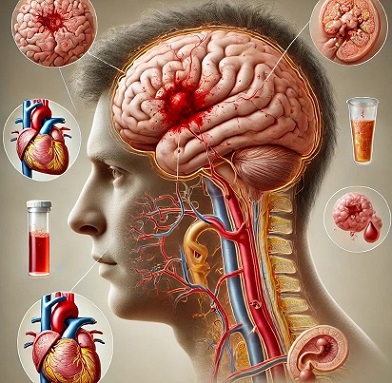Nikhil Prasad Fact checked by:Thailand Medical News Team Jul 09, 2024 9 months, 2 weeks, 2 days, 8 hours, 42 minutes ago
Medical News: Understanding what influences recovery after a stroke is critical. In recent research, scientists at Nihon University School of Medicine-Japan have uncovered significant insights into how body water balance, nutritional risk, and muscle health impact recovery outcomes for stroke patients. This
Medical News report explores their findings and what they mean for those affected by acute ischemic stroke (AIS).
 Body Water Balance - A Key to Recovery in Stroke Patients
Image - AI Generated
Stroke and Its Challenges
Body Water Balance - A Key to Recovery in Stroke Patients
Image - AI Generated
Stroke and Its Challenges
Acute ischemic stroke (AIS) is a major health issue globally, causing severe disability and death. Many patients who suffer from stroke require long-term care, and improving their recovery outcomes is a top priority. The researchers from Nihon University, including Dr Takayoshi Akimoto, Dr Kenta Tasaki, Dr Masaki Ishihara, Dr Makoto Hara, and Dr Hideto Nakajima, embarked on a study to identify factors that might predict poor recovery in stroke patients.
The Study
This study, titled "Association of Body Water Balance, Nutritional Risk, and Sarcopenia with Outcome in Patients with Acute Ischemic Stroke: A Single-Center Prospective Study," aimed to understand how body water balance, nutrition, and muscle health influence recovery in stroke patients.
The researchers monitored 111 patients who had experienced an AIS. They evaluated each patient's body water balance using bioelectrical impedance analysis (BIA), a technique that measures the ratio of extracellular water (ECW) to total body water (TBW). Overhydration, indicated by a higher ECW/TBW ratio, was one of the key factors assessed. They also measured the patients' nutritional risk using the geriatric nutritional risk index (GNRI) and evaluated muscle health based on criteria set by the Asian Working Group for Sarcopenia.
Key Findings
-Overhydration and Stroke Recovery
The study found that patients with overhydration (an ECW/TBW ratio greater than 0.390) were more likely to have poor recovery outcomes. Overhydration was significantly associated with higher rates of complications and longer hospital stays. This condition was particularly detrimental when combined with other risk factors like low muscle mass and poor nutrition.
-Nutritional Risk
Nutritional status also played a crucial role. Patients with a GNRI score below 98 were considered at nutritional risk and had worse recovery outcomes compared to those with better nutritional status. Malnutrition in stroke patients can lead to muscle wasting and weakened immune response, complicating recovery.
-Sarcopenia
Sarcopenia, or the loss of muscle mass and strength, was another critical factor. Patients with sarcopenia had significantl
y higher rates of poor outcomes. The loss of muscle mass not only affects mobility but also overall health, making recovery more challenging.
Combined Risks
The most significant finding was that the combination of overhydration, nutritional risk, and sarcopenia drastically increased the likelihood of poor recovery. Patients exhibiting all three conditions had the worst outcomes, highlighting the importance of a holistic approach to stroke recovery.
Implications for Treatment
This research underscores the importance of addressing multiple health aspects in stroke patients. Medical professionals should monitor not just the neurological status but also the hydration levels, nutritional intake, and muscle health of stroke patients. Early intervention in these areas could improve recovery outcomes significantly.
Hydration Management
Regular monitoring of body water balance through methods like BIA could help in early identification of overhydration, allowing timely interventions to correct fluid imbalances.
Nutritional Support
Ensuring adequate nutrition and addressing malnutrition promptly is vital. Nutritional support plans tailored to the needs of stroke patients can prevent complications associated with poor nutrition.
Physical Therapy
Incorporating physical therapy to maintain and improve muscle mass and strength is crucial. Regular exercise and physical activity can help mitigate the effects of sarcopenia and aid in faster recovery.
Conclusion
The study by researchers at Nihon University School of Medicine highlights critical factors influencing stroke recovery. Overhydration, poor nutrition, and muscle loss are key predictors of recovery outcomes. Addressing these issues holistically can improve the prognosis for stroke patients, ensuring better long-term health and quality of life.
The study findings were published in the peer-reviewed journal: Nutrients.
https://www.mdpi.com/2072-6643/16/13/2165
For the latest on Stroke Recovery, keep on logging to Thailand
Medical News.
Read Also:
https://www.thailandmedical.news/news/covid-19-and-stroke-new-insights-on-inflammation-and-recovery
https://www.thailandmedical.news/news/blueberries-could-hold-the-key-to-stroke-recovery
